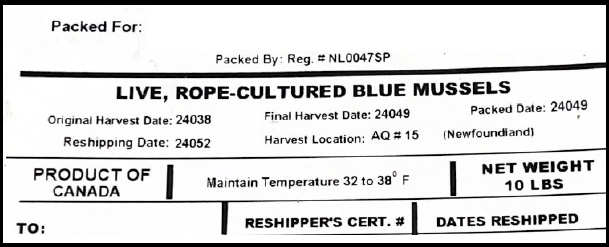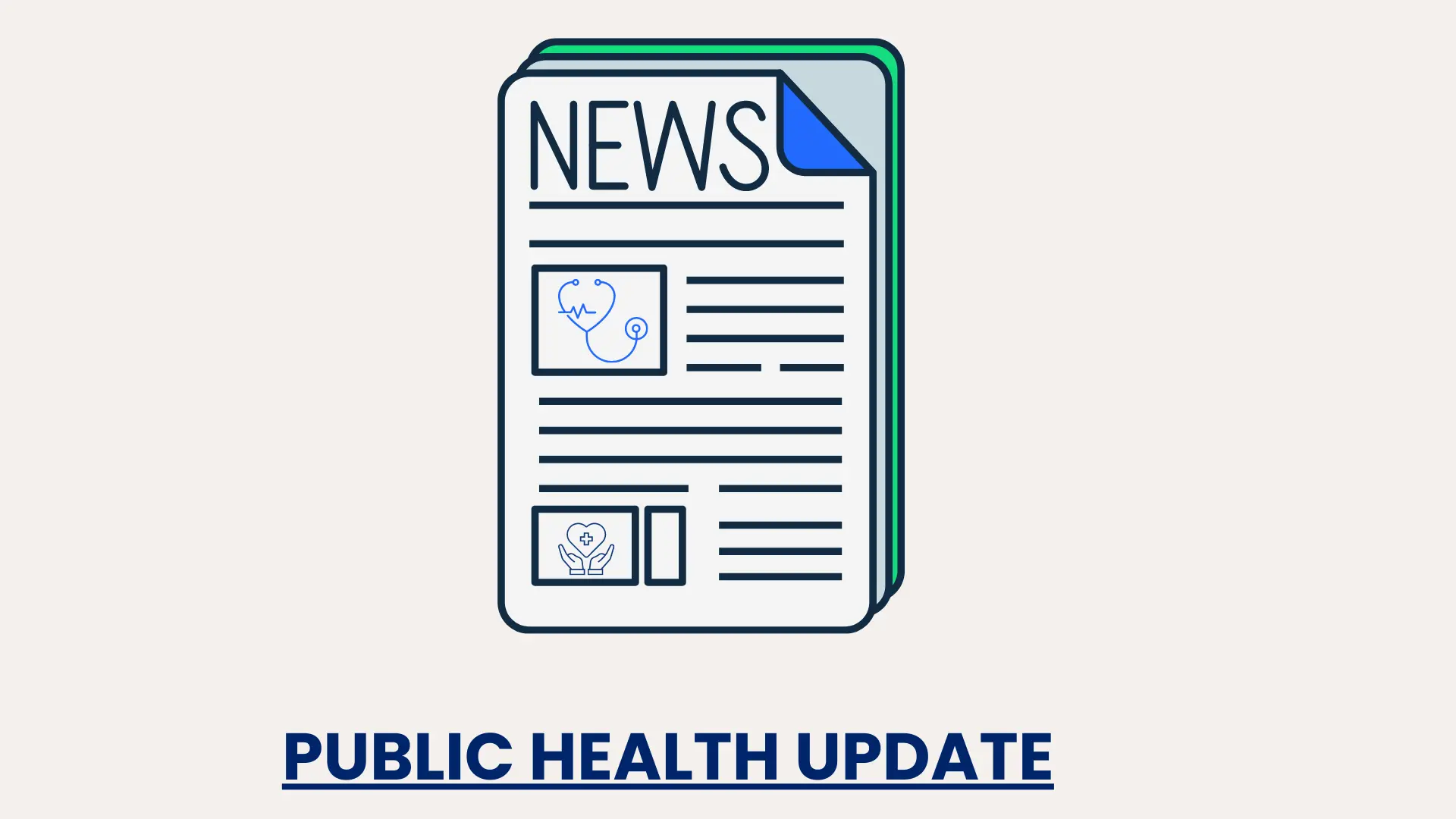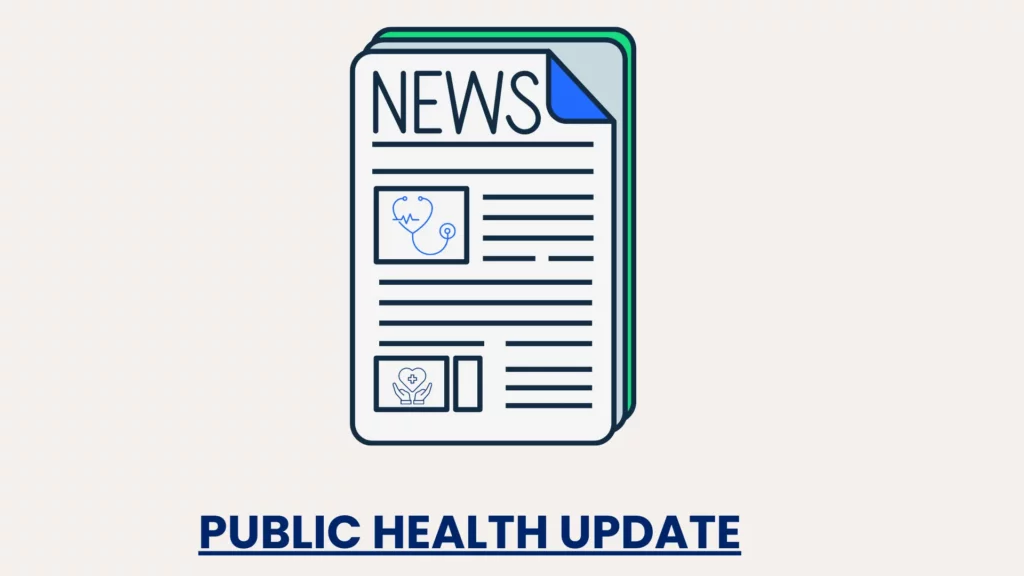The following content is from the FDA on March 8, 2024 and was not written by HVHD.
Audience
- Restaurants and food retailers in Connecticut (CT), Florida (FL), Maryland (MD), Massachusetts (MA), New Jersey (NJ), New York (NY), and Pennsylvania (PA) that have recently purchased mussels originally harvested on 2/07/2024 from harvest area AQ # 15 Newfoundland, Canada, with final harvest date of 2/18/2024.
- Consumers in CT, FL, MD, MA, NJ, NY, and PA who have recently purchased mussels originally harvested on 2/07/2024, from harvest area AQ # 15 Newfoundland, Canada, with final harvest date of 2/18/2024.
Product
Certain live mussels from Allen’s Fisheries, Ltd. (NL0047SP), Benoit’s Cove, Newfoundland, Canada were initially harvested on 2/07/2024 (Julian date 24038) from harvest area AQ # 15 Newfoundland, with final harvest date of 2/18/2024 (Julian date 24049) and shipped to distributors in CT, FL, MD, MA, NJ, NY, and PA on or around 2/21/2024 (Julian Date 24052). The live mussels were distributed to restaurants and retailers in CT, FL, MD, MA, NJ, NY, and PA and may have been distributed to other states, as well.
The following product tag is provided to be representative of labeling that would accompany the implicated mussels.

Purpose
The FDA is advising restaurants and food retailers not to serve or sell and to dispose of mussels and consumers not to eat mussels from Allen’s Fisheries (NL0047SP) in Newfoundland, Canada, harvested on 2/07/2024 (Julian date 24038), from harvest area AQ # 15 Newfoundland, with final harvest date of 2/18/2024 (Julian date 24049) and shipped to distributors in CT, FL, MD, MA, NJ, NY, and PA on or around 2/21/2024 (Julian Date 24052) because they may be contaminated.
Contaminated shellfish can cause illness, especially if eaten raw, particularly in people with compromised immune systems. Food contaminated with pathogens or biotoxins may look, smell, and taste normal. Consumers of these products who are experiencing food poisoning symptoms such as diarrhea, stomach pain or cramps, nausea, vomiting, or fever should contact their healthcare provider, who should report their symptoms to their local Health Department.
Summary of Problem and Scope
On 3/1/2024, the New Jersey Department of Health advised the FDA of an outbreak of illness associated with consumption of certain mussels. The cases experienced symptoms including nausea, vomiting and diarrhea. The advisory includes mussels from Allen’s Fisheries (NL0047SP) in Newfoundland, Canada, harvested on 2/07/2024 (Julian date 24038), from harvest area AQ # 15 Newfoundland, with final harvest date of 2/18/2024 (Julian date 24049) and shipped to distributors in CT, FL, MD, MA, NJ, NY, and PA on or around 2/21/2024 (Julian Date 24052).
FDA Actions
The FDA is issuing this alert advising restaurants and food retailers not to serve or sell and consumers not to eat mussels from Newfoundland, Canada, harvested on 2/07/2024 from harvest area AQ # 15 Newfoundland, with final harvest date of 2/18/2024, due to possible pathogen or biotoxin contamination. The FDA is awaiting further information on distribution of the mussels and will continue to monitor the investigation and provide assistance to state authorities as needed. As new information becomes available, the FDA will update the safety alert.
Recommendations for Restaurants and Retailers
Restaurants and retailers should not serve or sell the potentially contaminated mussels. Restaurants and retailers should dispose of any products by throwing them in the garbage or contacting their distributor to arrange for return and destruction.
Restaurants and retailers should also be aware that shellfish may be a source of pathogens and should control the potential for cross-contamination of food processing equipment and the food processing environment. They should follow the steps below:
- Wash hands with warm water and soap following the cleaning and sanitation process.
- Retailers, restaurants, and other food service operators who have processed and packaged any potentially contaminated products need to be concerned about cross-contamination of cutting surfaces and utensils through contact with the potentially contaminated products.
- Retailers that have sold bulk product should clean and sanitize the containers used to hold the product.
- Regular frequent cleaning and sanitizing of food contact surfaces and utensils used in food preparation may help to minimize the likelihood of cross-contamination.
Recommendations for Consumers
Consumers should not eat the potentially contaminated mussels. Consumers who have symptoms should contact their health care provider to report their symptoms and receive care.
To report a complaint or adverse event (illness or serious allergic reaction), you can:
- Call an FDA Consumer Complaint Coordinator if you wish to speak directly to a person about your problem.
- Complete an electronic Voluntary MedWatch form online.
- Complete a paper Voluntary MedWatch form that can be mailed to FDA.
Visit CFSAN’s Food & Cosmetic Information Center (FCIC) for additional consumer and industry assistance.


